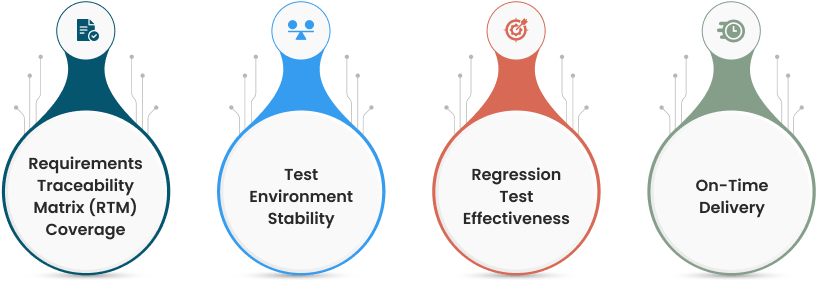Outsourcing software QA testing has become a strategic imperative for businesses aiming to streamline development cycles, reduce costs, and ensure the delivery of high-quality software products. However, the success of such partnerships heavily relies on selecting the right QA provider and establishing a robust framework for measuring their performance.
Some impressive stats about the QA software testing:
- According to Global Market Insights, the software testing market was valued at $51.8 billion in 2023 and is anticipated to grow at a CAGR of over 7% from 2024 to 2032, driven by increased product launches and innovations from major companies.
- The software testing industry has surpassed the $45 billion mark in market size, highlighting its crucial importance.
- The software testing market is on a steady rise, with an expected Compound Annual Growth Rate (CAGR) of 5% from 2023 to 2027.
- In Europe, the banking, financial services, and insurance sectors lead the software testing market, accounting for a significant 28.5% share.
- Looking forward, the global software testing market is poised to reach an impressive $109.5 billion by 2027.
- Automation testing is gaining prominence, with predictions estimating its value to reach $68 billion by 2025, marking a significant growth milestone.
- Quality Assurance (QA) is becoming increasingly important in development budgets, with an expected allocation of around 40% of the total cost.
The stats and figures about QA software testing indicate that there has been increasing demand for error-free software which has stimulated the market for advanced testing tools and techniques. Most companies today outsource their software QA testing to offshore IT companies. Here, Key Performance Indicators (KPIs) serve as crucial benchmarks to assess the effectiveness and value delivered by your outsourced QA team.
This comprehensive guide delves into the essential KPIs that clients should consider when evaluating their QA partners, offering valuable insights into optimizing software quality assurance processes.
The Critical Role of KPIs in Outsourced QA
KPIs are quantifiable metrics that provide objective insights into various dimensions of the QA process, including efficiency, effectiveness, quality, and cost-effectiveness. They enable you to gauge the impact of your outsourcing initiative on software quality, development timelines, and overall business objectives.
You can identify areas for improvement, foster data-driven decision-making, and ensure that your QA provider aligns with your strategic goals by consistently monitoring and analyzing relevant KPIs.
Core KPIs for Evaluating Outsourced QA Providers
A comprehensive evaluation of your outsourced QA provider should encompass a range of KPIs that cover different aspects of the testing process. When you hire QA engineers, it’s crucial to ensure these KPIs are met to maintain the quality and reliability of your software.

1. Defect Detection Rate (DDR)
This KPI quantifies the percentage of defects identified during testing. A higher DDR signifies thoroughness in testing methodologies and the early detection of potential issues, which is essential for preventing costly defects from reaching production environments. Monitoring the DDR helps you assess the effectiveness of your QA partner’s test case design, test coverage, and overall testing approach.
2. Defect Leakage Rate (DLR)
In contrast to DDR, the DLR measures the percentage of defects that escape detection during testing and are discovered in production. A lower DLR indicates the efficacy of the QA process in identifying and rectifying issues before they impact end-users. Tracking the DLR over time helps you understand the effectiveness of regression testing and identify areas where testing strategies might need refinement.
3. Test Case Efficiency (TCE)
This KPI evaluates the ratio of defects found to the number of test cases executed. A higher TCE suggests that test cases are well-designed, focused, and capable of uncovering critical defects. By analyzing TCE, you can identify opportunities to optimize test case selection and prioritization, ensuring that testing efforts are concentrated on the most high-risk areas of the software.
4. Test Automation Coverage
The extent to which test cases are automated is a pivotal factor in determining the efficiency and speed of the QA skills process. Higher automation coverage translates to faster test execution, improved accuracy, and reduced manual effort. Setting realistic automation targets and monitoring progress towards these goals can help you gauge the QA provider’s commitment to leveraging automation for optimal results.
5. Test Execution Time
This KPI tracks the time required to complete test cycles. Shorter execution times indicate streamlined processes, efficient test case design, and the ability to provide rapid feedback to development teams. Identifying bottlenecks in the testing workflow and implementing optimizations can significantly reduce execution time and enhance overall project agility.
6. Customer Satisfaction (CSAT)
While quantitative metrics are essential, the subjective feedback of stakeholders is equally valuable. Regularly assessing customer satisfaction through surveys or feedback mechanisms provides insights into the QA provider’s communication, responsiveness, collaboration, and overall value delivery. A high CSAT score signifies a strong partnership and alignment with your business objectives.
Need Professional QA Services?
Ensure your software’s quality with our expert QA services. Our experienced QA developers are ready to meet your testing needs and exceed expectations.
Additional KPIs for Enhanced Evaluation
Beyond the core KPIs, you can consider tracking additional metrics to gain a more comprehensive understanding of your outsourced QA provider’s performance:

Requirements Traceability Matrix (RTM) Coverage
This metric ensures that all software requirements are mapped to corresponding test cases, ensuring complete test coverage and mitigating the risk of overlooking critical functionalities.
Test Environment Stability
The stability of the test environment directly impacts the accuracy and reliability of test results. Monitoring the uptime and stability of the test environment helps you assess the QA provider’s infrastructure management capabilities.
Regression Test Effectiveness
As software evolves, regression testing becomes crucial to ensure that new changes do not introduce unintended consequences. Evaluating the effectiveness of regression tests helps you gauge the QA team’s ability to safeguard existing functionality.
On-Time Delivery
Timely delivery of QA services is essential for maintaining project timelines and avoiding costly delays. Tracking the QA team’s adherence to agreed-upon schedules and milestones helps you assess their commitment to meeting deadlines.
WeblineIndia: Your Trusted QA Partner
WeblineIndia stands as a leading IT agency specializing in software QA and testing services. Our unwavering commitment to quality, technical prowess, and customer-centric approach make us the ideal partner for businesses seeking to outsource their QA needs. We offer a comprehensive suite of QA services tailored to your specific requirements, including functional, performance, security, and mobile testing.
Our team of seasoned QA professionals brings a wealth of experience and expertise to the table. We pride ourselves on transparent communication, providing regular updates and detailed reports on testing progress. Our proven track record of successful collaborations across diverse industries underscores our dedication to delivering exceptional results.
Elevate Your QA with WeblineIndia
Partnering with WeblineIndia empowers you to streamline your QA processes, enhance software quality, and accelerate time-to-market. We understand the intricacies of measuring success through KPIs and collaborate closely with you to achieve your desired outcomes. By leveraging our expertise and comprehensive QA services, you can confidently deliver high-quality software that meets and exceeds user expectations.
Conclusion
In the realm of software development, effective QA is paramount. By carefully selecting a QA provider and implementing a robust KPI framework, you can ensure that your software testing efforts yield tangible results, contributing to the overall success of your projects.
Remember, choosing the right QA partner and establishing clear performance metrics are essential steps in achieving your software quality goals. Contact us now to navigate the complexities of QA with confidence and keep your software solutions and tools that consistently delight your users.
Social Hashtags
#KPIs #QAProvider #KeyPerformanceIndicators #OutsourcedQA #QualityAssurance #QAMetrics #PerformanceMetrics #KPIMeasurement #QAStandards #BusinessKPIs #WeblineIndia
Get Reliable QA Services with WeblineIndia
Ensure your software’s quality and reliability with WeblineIndia’s expert QA services. Partner with us for comprehensive, top-notch testing solutions.
Testimonials: Hear It Straight From Our Global Clients
Our development processes delivers dynamic solutions to tackle business challenges, optimize costs, and drive digital transformation. Expert-backed solutions enhance client retention and online presence, with proven success stories highlighting real-world problem-solving through innovative applications. Our esteemed Worldwide clients just experienced it.
Awards and Recognitions
While delighted clients are our greatest motivation, industry recognition holds significant value. WeblineIndia has consistently led in technology, with awards and accolades reaffirming our excellence.

OA500 Global Outsourcing Firms 2025, by Outsource Accelerator

Top Software Development Company, by GoodFirms

BEST FINTECH PRODUCT SOLUTION COMPANY - 2022, by GESIA

Awarded as - TOP APP DEVELOPMENT COMPANY IN INDIA of the YEAR 2020, by SoftwareSuggest